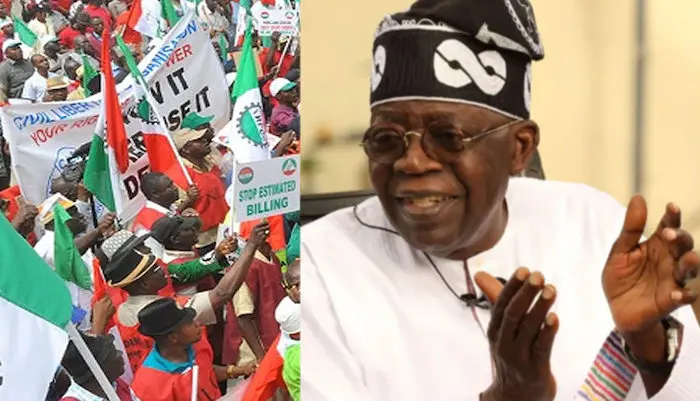
PRES. TINUBU TO MEET WITH ORGANISED LABOUR THURSDAY OVER MINIMUM WAGE
On Thursday, President Bola Tinubu will meet with organized labor in Abuja to continue the conversation over a new minimum wage for Nigerian workers.
The leadership of the Nigeria Labour Congress (NLC) and Trade Union Congress (TUC) have been called by the President to a meeting that is scheduled to take place in the Aso Villa in the country’s capital city, a top labor source told Channels Television.
The $62,000 government and private sector proposal and the $250,000 organized labor demand are expected to be decided upon by the President.
About a month has passed since the President announced during his Democracy Day speech on June 12, 2024, that the National Assembly will soon be presented with an executive bill establishing a new national minimum wage for workers. This meeting is scheduled for this Thursday.
In order to allow for further interaction with stakeholders, the President-chaired Federal Executive Council (FEC) withdrew from its consideration and deliberation of the memo on the new minimum wage on June 25.
Two days later, at the 141st meeting of the National Economic Council (NEC), Tinubu and Vice President Kassim Shettima convened with ministers and governors of the 36 states that make up the Federation to discuss a new minimum wage for workers.
There have long been discussions about raising the minimum wage for Nigerian employees. In April 2024, the Minimum Pay Act of 2019, which set the minimum pay at ₦30,000, came to an end. Every five years, the Act should be reviewed to ensure it still meets the needs of modern workers in terms of the economy.
A tripartite committee was established by President Bola Tinubu in January to negotiate a new minimum wage for laborers. The committee is made up of representatives from the organized private sector, federal and state governments, and organized labor.
On Monday, June 3, 2024, labor was forced to declare an indefinite strike due to the committee members’ inability to come to a consensus on a new, realistic minimum wage for workers. As labor shut down banks, hospitals, airports, the national grid, the National Assembly, and state assemblies’ complexes, businesses came to a standstill.
The labor unions claimed that the current ₦30,000 minimum wage was insufficient to support the needs of the average Nigerian worker and that the government should provide workers with a more competitive wage in light of the country’s current inflationary pressures, the consequences of the administration’s twin policies of eliminating gasoline subsidies, and the unification of its forex windows.
Labour “relaxed” its strike on June 4, 2024 following assurances from the President that he was committed to a wage above ₦60,000.
Both the Trade Union Congress (TUC) and Nigeria Labour Congress (NLC) leadership subsequently resumed talks with the representatives of the Federal Government, states, and the Organised Private Sector.
On Friday, June 7, 2024, the two sides (labour and the government) still failed to reach an agreement. While labour dropped again its demand from ₦494,000 to ₦250,000, the government added ₦2,000 to its initial ₦60,000 and offered workers ₦62,000.
Both sides submitted their reports to the President who is expected to make a decision and send an executive bill to the National Assembly to pass a new minimum wage bill to be signed into law by the President.
